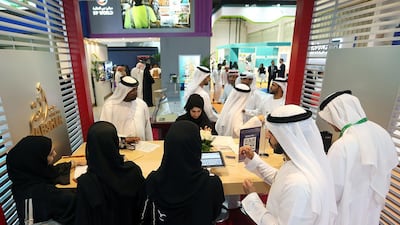ABU DHABI // Emirati employees and the private sector need to get on the same page to avoid a dramatic increase in unemployment among citizens over the next few years.
Speakers at the seventh annual Emiratisation Forum in Abu Dhabi yesterday said that both sides had to adapt to the other’s requirements and expectations to speed up the painstakingly slow increase in the hiring of citizens.
Despite last year being named the Year of Emiratisation as part of national agenda goals to increase the number of Emiratis in the private sector, Faisal Al Nuaimi said targets were not being met.
“In 2014 we increased this number by only 0.5 per cent, well short of the 1.5 per cent target,” said the general manager of the Ajman Tourism Development department.
To address the challenge of employing an increasing number of graduates, the two sides had to speak the same language, Mr Al Nuaimi said.
“We are expecting more than 250,000 graduates looking for new jobs by 2020, and with 63 per cent of available jobs being from the private sector, and rising, there has to be better understanding between them.”
While the onus of training Emiratis from the beginning, offering them opportunities to take important decisions and providing them with upward mobility fell on the companies, Emirati job seekers needed to be open-minded about work hours, be more task orientated and realise their significance as being the pillars of the country’s economic development.
“There has to be more trust between them, [then] Emiratis will see that they can develop rapidly in the private sector, while companies will see that locals are more than capable workers,” Mr Al Nuaimi said.
Omar Al Khatheeri, chairman of Sundus, a recruitment company that focused on Emiratis, said the private sector had to get more involved in education and training.
“Universities are producing graduates on a large scale, but they might not fulfil the needs of the market.”
With companies such as Etisalat, Adnoc and Etihad creating their own successful training programmes he said the government should encourage other large companies to do the same.
“You see companies getting involved with universities, but not on the scale we would like. We still don’t have the momentum we need.”
Adjusting to the needs of the community you wish to hire in was an important lesson Etihad Airways had learnt early on, said Wissam Hachem, the airline’s vice president of learning and development.
After trying to hire a handful of Emiratis for their call centre in Abu Dhabi and interviewing more than 120 candidates, he said they were surprised when they could not recruit one.
“Ninety per cent of the candidates were women from Al Ain. Obviously they couldn’t come to us so we said, ‘why don’t we go to them?’,” Mr Hachem said.
Relocating the call centre to Al Ain was only the first step as Etihad also based work hours around the employees’ schedules, as well as developed them by means of language and skills training on an individual basis.
With the Etihad call centre proving a success – more than 100 Emirati women work there – the company opted to open another business centre in Al Ain last year.
“Every airline outsources its revenue accounting to other parts of the world, but now we have more than 400 UAE women employed at the centre,” he said.
Mr Hachem said Etihad planned to increase this number to 1,000 by 2017.
The two-day Emiratisation Forum ends on Tuesday.
tsubaihi@thenational.ae

